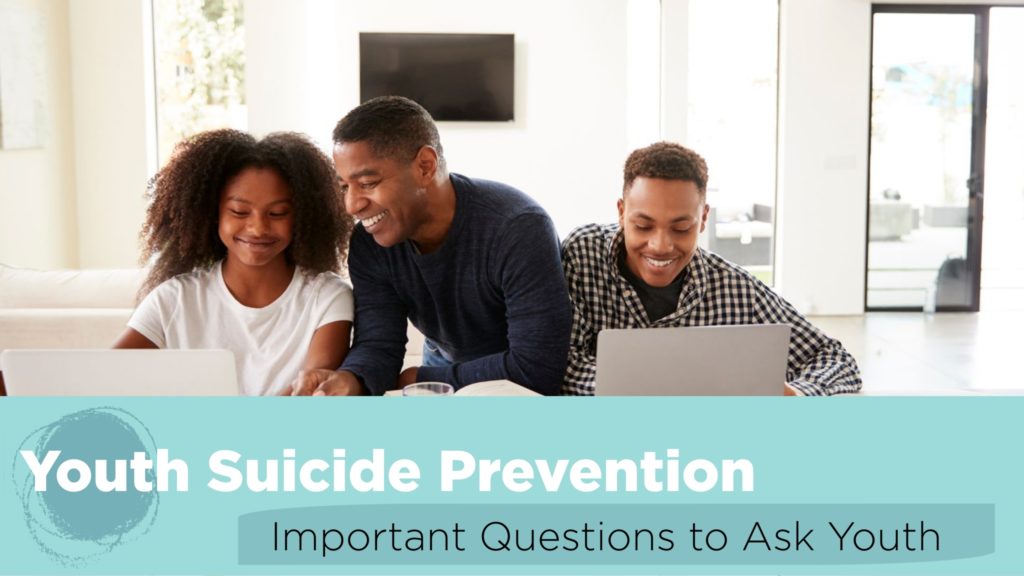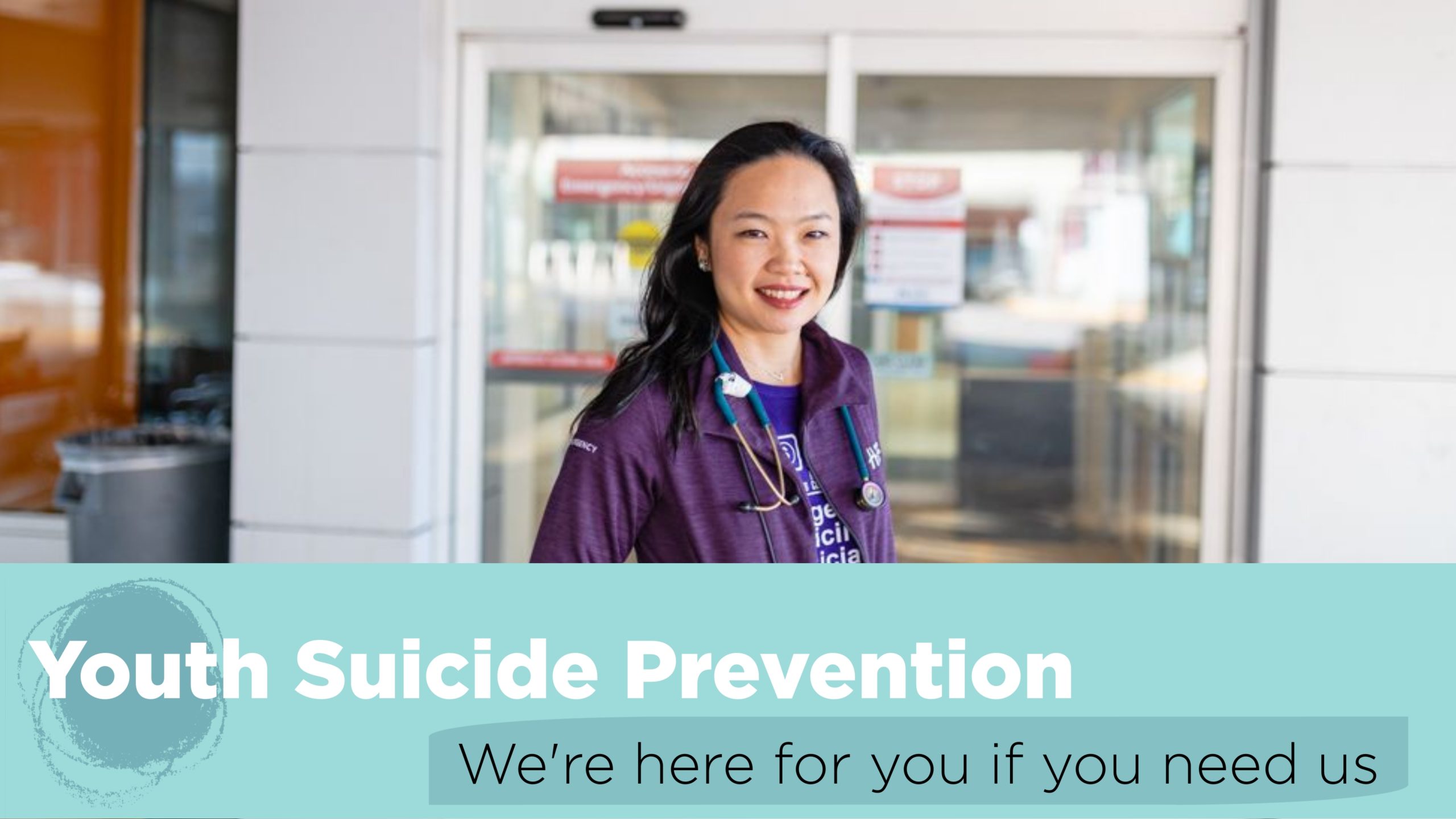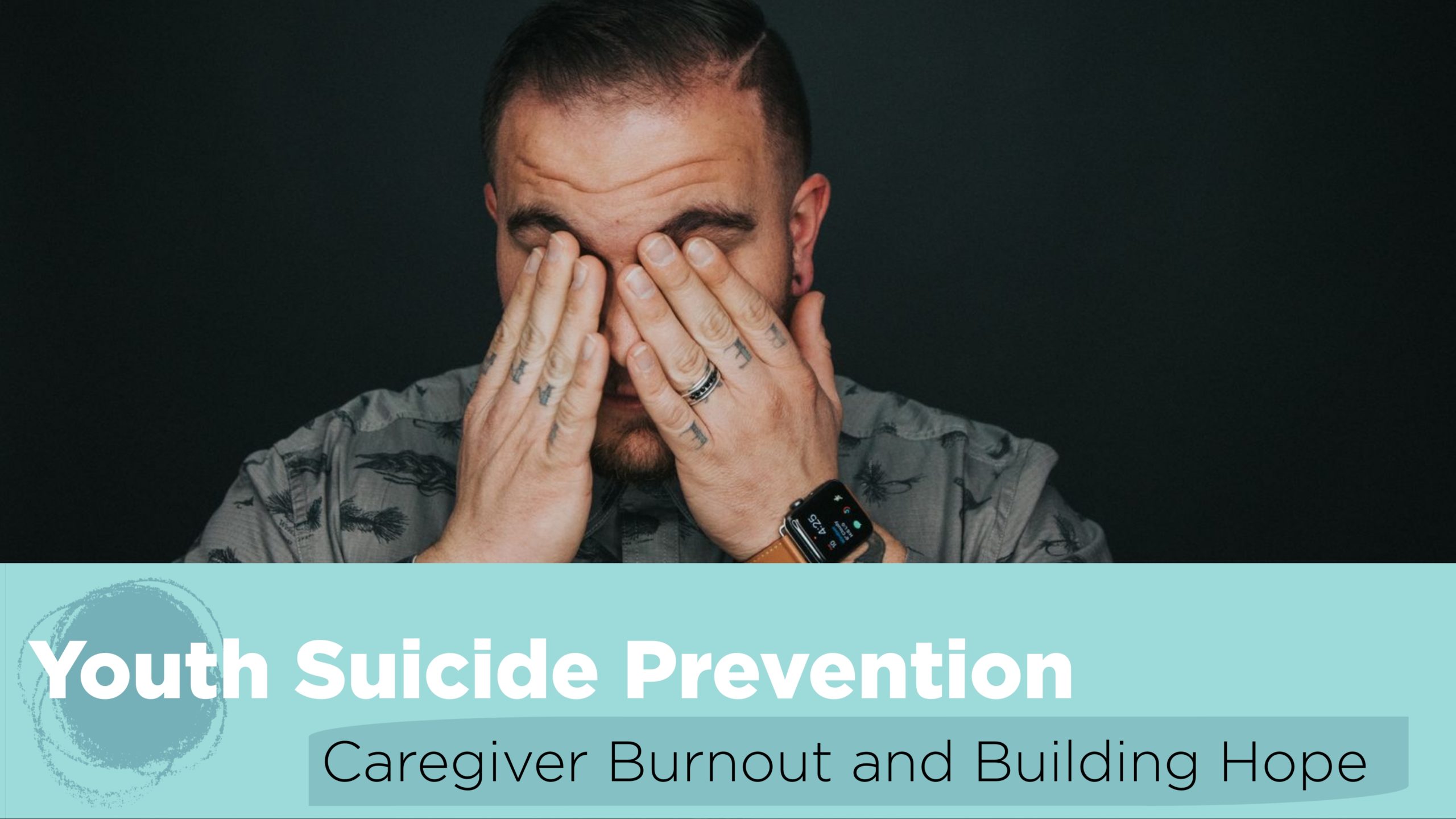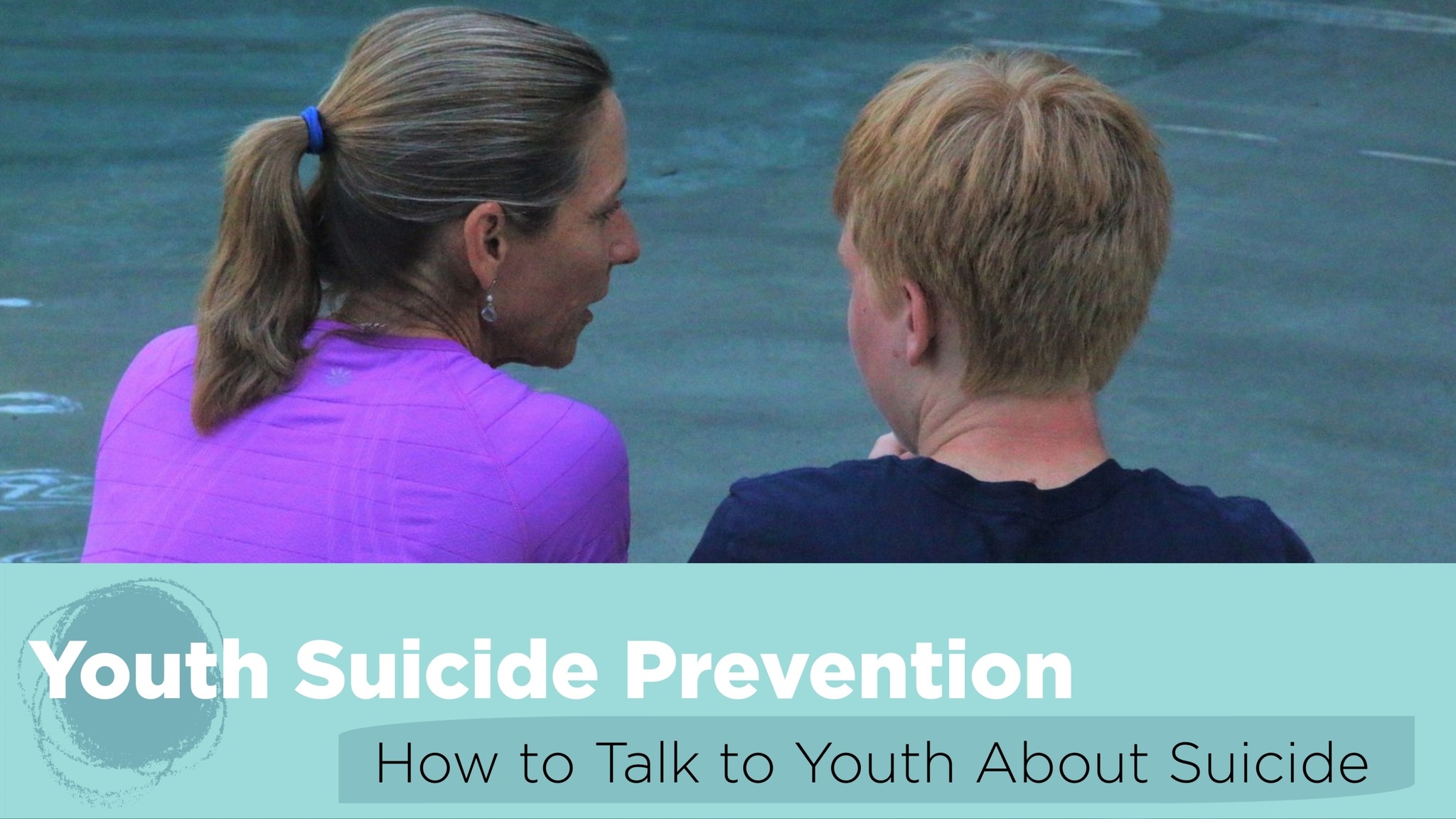
Youth suicide prevention series: Important questions to ask youth
By Olabode Akintan, child and adolescent psychiatrist, McMaster Children’s Hospital Child & Youth Mental Health Program
This video gives caregivers a starting place for the ongoing (and potentially life-saving) conversations we encourage they have with youth who are struggling with suicide. It focuses on the difference between (1) thinking about suicide, (2) planning for suicide, and (3) taking action to end one’s life – all things that need to be taken seriously and often indicate the types of supports that will be most helpful for youth.
Talking about suicide can be overwhelming, or at least uncomfortable, for most people. If you’re a parent or caregiver, this video is going to focus on essential questions you can ask your young person to help keep them safe and support them if they are thinking of suicide.
Please feel free to pause this video at any time or watch it again. And definitely reach out to a professional if you feel triggered by the discussion.
Thinking about suicide
We see suicidal thoughts and actions as being different. Suicidal thoughts are actually more common than many people think. And so, you may say something like: “I know you’ve been struggling. When life becomes too stressful or just isn’t what we need it to be, people can wish they just weren’t here anymore and can think about death. They just want their struggles to be over. Have you ever had thoughts like that?”
If your young person is thinking of suicide, it’s important to know whether their thoughts are passive – “I wish I weren’t here anymore…what would life be like without me?” Or active – “I’m going to kill myself.” To know this, it’s best to ask them directly by saying something like: Are your thoughts like “I just don’t want to be here anymore” or are they more specific, like “I want to kill myself” or “I’m going to kill myself?” It’s important to be as clear as possible because your next action could be different depending on the response you receive and you don’t want to make any assumptions.
Planning for suicide
As professionals, we take all thoughts of suicide seriously. However, active suicidal thoughts increase the risk of someone taking action.
After learning that your young person is thinking of suicide, it’s important to ask them the question of whether they intend to act on their thoughts. Consider asking: “Have you ever thought about acting on your thoughts?”
Many people who think about suicide have no intention on acting on their thoughts. If this is your young person, you definitely want to know why because it helps us understand their reasons for living and can allow us to strengthen their commitment to life. If your young person says that they do intend or want to act on their thoughts, this is more serious and you should consider taking them immediately to a mental health professional or the hospital.
The most important thing to know about someone’s risk of dying by suicide is that risk is always changing. It’s possible that a person will be committed to life one hour and in complete despair the next. So, conversations about suicide have to be ongoing, especially if you know that your child has struggled in this way. Talking about suicide does NOT give people ideas. Instead it allows for open conversations.
You’re doing great! Take a few deep breaths, these conversations are difficult and require bravery but they are essential.
Talking about suicide does NOT give people ideas. Instead it allows for open conversations.
Taking action
Regardless of whether your young person currently has thoughts or intentions of ending their life, we encourage you to ask whether they have ever attempted to end their life before. Again, it’s best to be calm and specific when asking this – you might say: “Have you ever tried to kill yourself or prepared to? Tell me about that. You’re not in trouble. I really want to help and am grateful you’re telling me now.”
This is definitely something that professionals need to know as it does place a person at a greater risk of suicide and may speak to how they may try to harm themselves in the future. It’s always concerning when people have attempted to end their life and have never told anyone.
Please know that people thinking of suicide do not need to have a plan for how they will end their life. In fact, most children and youth do not have a plan and act spontaneously. But we still ask if they have a plan because knowing this may also help keep them safe, by removing potential items.
Sometimes young people have plans that adults know will NOT result in death or even serious injury. When assessing suicide risk, it matters more what the person thinks will happen. If your young person is doing something that they think will end their life, this is serious and requires professional attention. Some caregivers having this conversation may learn that their child has a plan and has started acting on it – perhaps saying goodbye to friends, gathering supplies, or selecting a location. If this is the case for your young person, proceed to the nearest emergency room or call 911.
Many parents wonder about the relationship between suicide and self harm – see our How to talk to youth about suicide video for more information.
Be direct, calm and compassionate
You may be wondering how to go about having this conversation with your child. The truth is, it’s important to be direct, calm, and compassionate – that’s a tall order for a topic that many people feel intimidated by and some simply can’t understand. For some, it’s fear. But, by being direct, calm, and compassionate, you’ll assure your child that you can handle what they have to tell you and show that you are taking their struggles seriously.
Many parents have found it helpful to first practice saying the words “suicide,” “self harm,” and any other things that can be emotional or difficult to say. There’s no shame in practicing this conversation with yourself in the mirror, a co-parent, or close friend. There’s also no perfect way. It’s far better to ask than to wait for the perfect moment – because this ongoing conversation could honestly save your child’s life. In fact, simply knowing you care enough to have this conversation can lower their distress and increase their commitment to life.
Know that you’re not alone. These questions will help you to keep your young person safe and ensure that you are aware of when to involve a mental health professional. If you’re ever unsure, it’s best to reach out for professional help.
Here are some examples of the questions we spoke about in the video above:
- I know you’ve been struggling. When life becomes too stressful or just isn’t what we need it to be, people can wish they just weren’t here anymore and can think about death. They just want their struggles to be over. Have you ever had thoughts like that?
- Are the thoughts like “I just don’t want to be here anymore” or are they more specific, like “I want to kill myself” or “I’m going to kill myself?”
- Have you ever thought about acting on your thoughts?
- Have you ever tried to kill yourself or prepared to? Tell me about that – you’re not in trouble. I really want to help and am grateful you’re telling me now.
If you or your child is experiencing a mental health crisis, call 911 or go to the nearest emergency department. You may also call a crisis line, listed below. To connect with public mental health services in your area, please contact your family doctor to consider your options. Some options for children up to 18 years old are listed below. In some cases, self-referral is possible.
Community Resources
CANADA-WIDE: Available 24/7
- Kids Help Phoneline 1-800-668-6868 Text and Live Chat options: https://kidshelpphone.ca/
- LGBT Youthline 647-694-4275 Live chat messaging available: https://www.youthline.ca/
- Trans LifeLine (All Ages) 1-877-330-6366
- Canada Suicide Prevention Service (CSPS) 1-833-456-4566
- First Nations and Inuit Hope for Wellness 1-855-242-3310
- Canadian Indian Residential Schools Crisis Line 1-866-925-4419
HAMILTON
- Crisis Line: COAST 905-972-8338; Toll Free: 1-844-972-8338 Answered 24-7
- Connection to public mental health services (0-18 years old): CONTACT Hamilton 905-570-8888 or info@contacthamilton.ca
BRANT/BRANTFORD
- Crisis Line: St. Leonard’s Mental Health Crisis Line 519-759-7188; Toll Free: 1-866-811-7188 Answered 24-7
- Connection to public mental health services (0-18 years old): CONTACT Brant 519-758-8228 or information@contactbrant.net
HALDIMAND NORFOLK REGION
- Crisis Line: Haldimand Norfolk REACH 1-866-327-3224 Answered 24-7
- Connection to public mental health services (0-18 years old): CONTACT Haldimand Norfolk 519-587-2441; Toll Free: 1-800-265-8087 x. 350
NIAGARA
- Crisis Line: Pathstone Crisis Support Line 1-800-263-4944 Answered 24-7
- Connection to public mental health services (0-18 years old): CONTACT Niagara 905-684-3407 or info@contactniagara.org
HALTON
- Crisis Line: ROCK Crisis Line 905-878-9785
- Connection to public mental health services (0-18 years old): Reach Out Centre for Kids (ROCK) 289-266-0036



